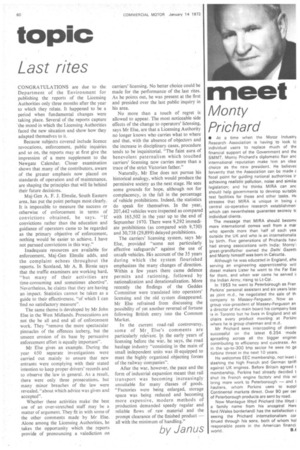topic
Page 62

If you've noticed an error in this article please click here to report it so we can fix it.
Last rites
CONGRATULATIONS are due to the Department of the Environment for publishing the reports of the Licensing Authorities only three months after the year to which they relate. It happened to be a period when fundamental changes were taking place. Several of the reports capture the mood in which the Licensing Authorities faced the new situation and show how they adapted themselves to it, Because subjects covered include licence revocations, enforcement, public inquiries and so on, the reports may at first give the impression of a mere supplement to the Newgate Calendar. Closer examination shows that many of the contributors, aware of the greater emphasis now placed on standards of operation and of maintenance, are shaping the principles that will lie behind their future decisions.
Maj-Gen A. F. J. Elmslie, South Eastern area, has put the point perhaps most clearly. It is impossible to measure the success or otherwise of enforcement in terms of convictions obtained, he says. "If convictions rather than the education and guidance of operators came to be regarded as the primary objective of enforcement, nothing would be easier to achieve. I have not pursued convictions in this way."
Inadequate resources are available for enforcement, Maj-Gen Elmslie adds, and the complaint echoes throughout the reports. In Scotland, Mr A. B. Birnie says that the traffic examiners are working hard, "but many of their activities are time-consuming and sometimes abortive". Nevertheless, he claims that they are having an impact. Statistics cannot be taken as a guide to their effectiveness, "of which I can find no satisfactory measure".
The same theme is developed by Mr John Else in the West Midlands. Prosecutions are not the be all and end all of enforcement work. They "remove the more spectacular pinnacles of the offences iceberg, but the unseen erosion of its base by persuasive enforcement effort is equally important".
Mr Else gives an example. During the year 650 separate investigations were carried out mainly to ensure that new entrants were complying with their stated intention to keep proper drivers' records and to observe the law in general. As a result, there were only three prosecutions, but many minor breaches of the law were revealed, "about which advice was given and accepted".
Whether these activities make the best use of an over-stretched staff may be a matter of argument. They fit in with some of the other comments made by Mr Else. Alone among the Licensing Authorities, he takes the opportunity which the reports provide of pronouncing a valediction on carriers' licensing. No better choice could be made for the performance of the last rites. As he points out, he was present at the first and presided over the last public inquiry in his area.
No more than a touch of regret is allowed to appear. The most noticeable side effects of the change to operators' licensing, says Mr Else, are that a Licensing Authority no longer knows who carries what to where and that, with the absence of objectors and the increase in disciplinary cases, procedure tends to be inquisitorial. "The faint aura of benevolent paternalism which touched carriers' licensing now carries more than a trace of the strict Victorian father."
Naturally, Mr Else does not pursue his historical analogy, which would produce the permissive society as the next stage. He sees some grounds for hope, although not for complacency, in the fall in the percentage of vehicle prohibitions. Indeed, the statistics do speak for themselves. In the year, 207,442 vehicles were inspected as compared with 165,502 in the year up to the end of September 1970. There were 9,292 immediate prohibitions (as compared with 9,730) and 30,738 (29,899) delayed prohibitions.
The carriers' licensing system, says Mr Else, provided "some not particularly effective safeguards" against the use of unsafe vehicles. His account of the 35 years during which the system flourished emphasizes the many changes of direction. Within a few years there came defence permits and rationing, followed by nationalization and denationalization. More recently the findings of the Geddes Committee were translated into operators' licensing and the old system disappeared. Mr Else refrained from discussing the possibility of yet another reversal of fortune following British entry into the Common Market.
In the current road-rail controversy, some of Mr. Else's comments are particularly relevant. I,n the early years of licensing before the war, he says, the road haulage industry "consisting in the main of small independent units was ill-equipped to meet the highly organized objecting forces of the railway companies".
After the war, however, the pace and the form of industrial expansion meant that rail transport was becoming increasingly unsuitable for many Classes of goods. "Factories were being enlarged, storage space was being reduced and becoming more expensive, modern methods of production demanded speedy regular and reliable flows of raw material and the prompt clearance of the finished product — all with the minimum of handling."
by Janus
















































































































